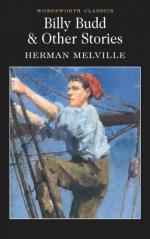|
This section contains 8,519 words (approx. 29 pages at 300 words per page) |

|
SOURCE: “Melville's Handsome Sailor: The Anxiety of Innocence,” in American Literature, Vol. 66, No. 1, March, 1994, pp. 83–103.
In the following essay, Ruttenburg maintains that the character of Billy Budd exemplifies the ideal poet conceived by Ralph Waldo Emerson and Walt Whitman.
“I feel, with dejection and amazement,” Walt Whitman lamented in Democratic Vistas (1872), “that few or none have yet really spoken to [the American] people, created a single, image-making work for them [so that their] central spirit [remains] uncelebrated, unexpress'd.”1 He dismissed contemporary literature as the product of a merely “verbal intellect,” powerless to move those few who had retained an instinctive fidelity to the ideal of genuine American expression and who, in their isolation, remained “obedient, lowly, reverent to the voice, the gesture of the god, or holy ghost, which others see not, hear not” (DV, 395, 391). While the “class of supercilious infidels” refused to be silent, those who might...
|
This section contains 8,519 words (approx. 29 pages at 300 words per page) |

|


